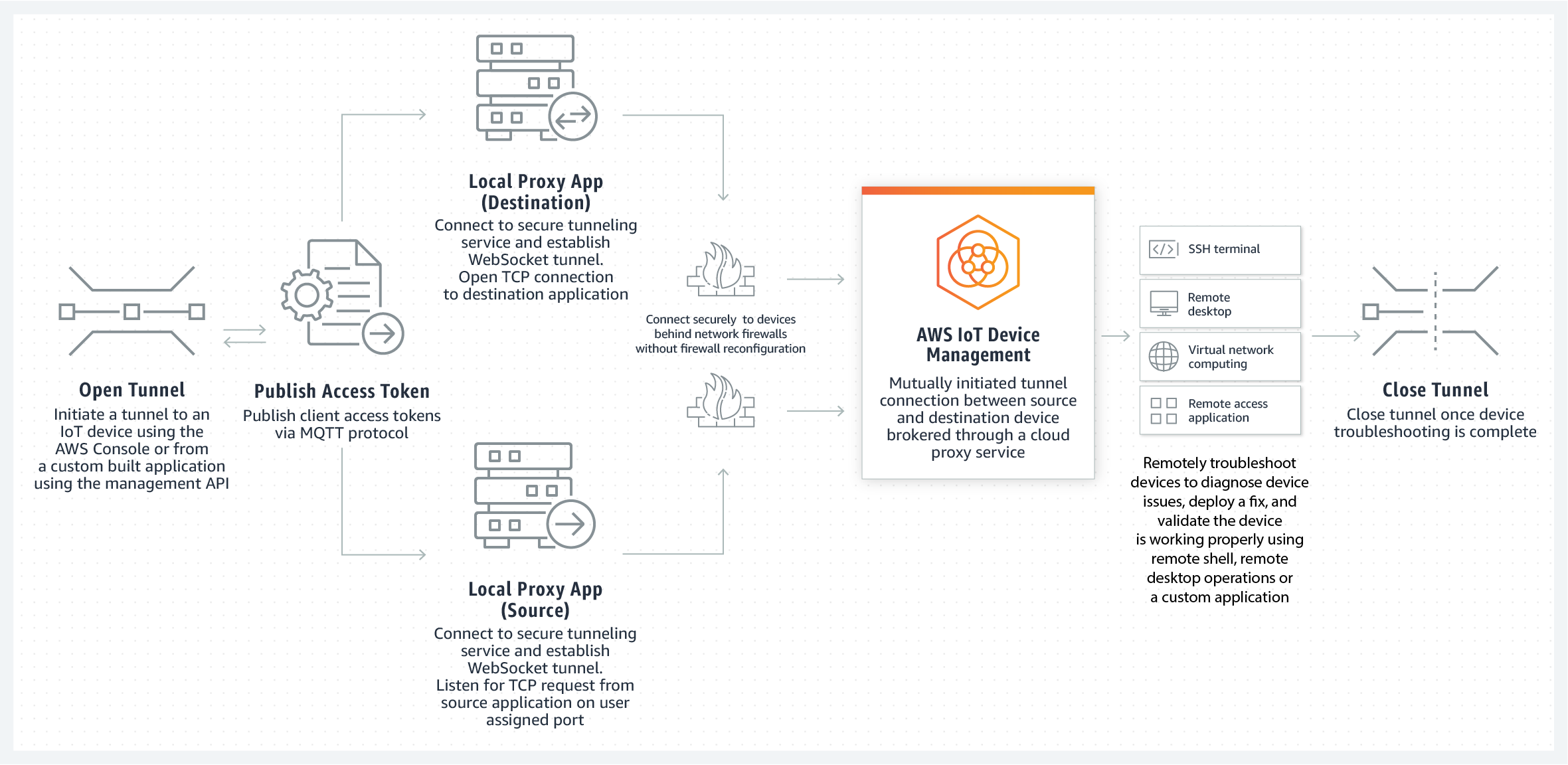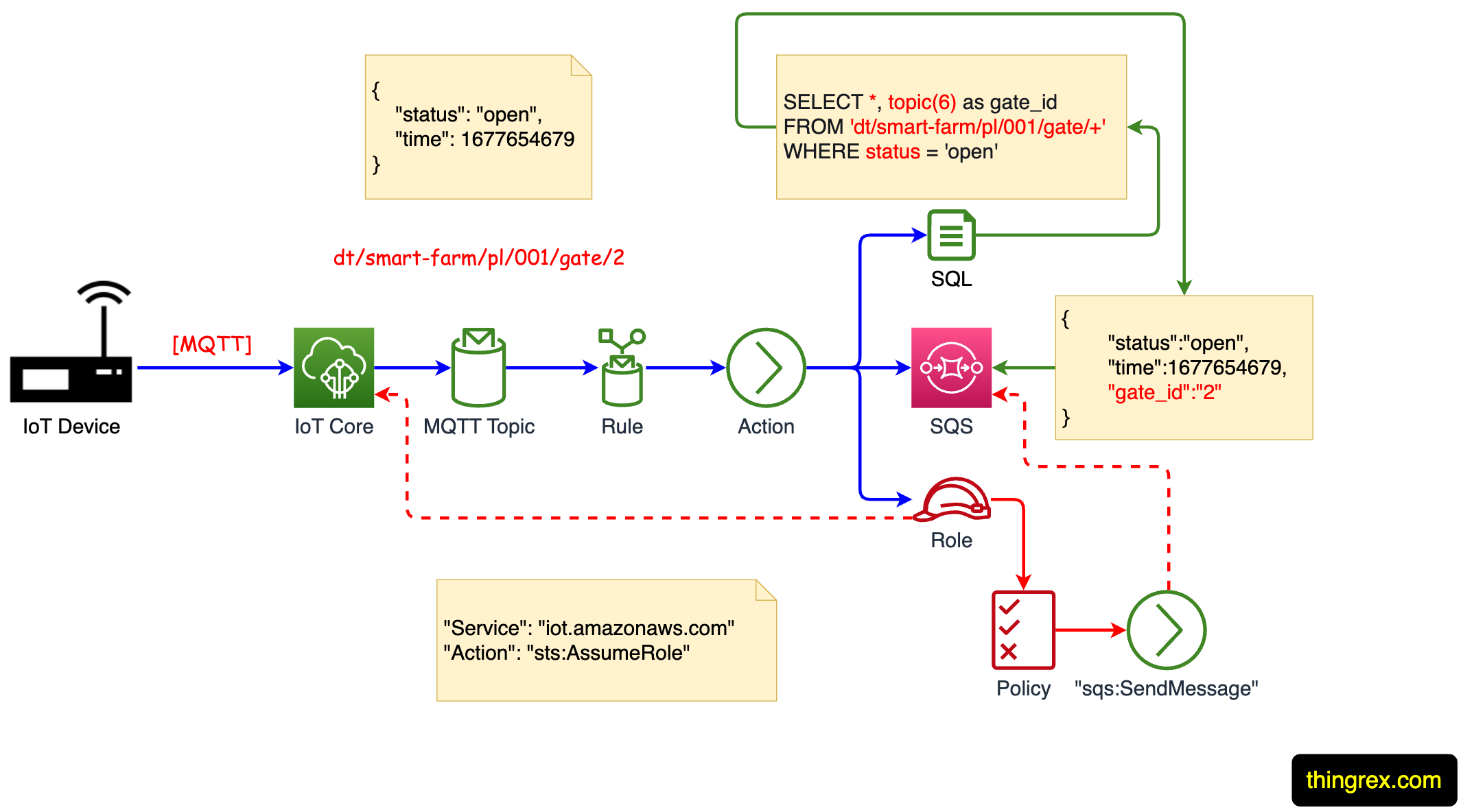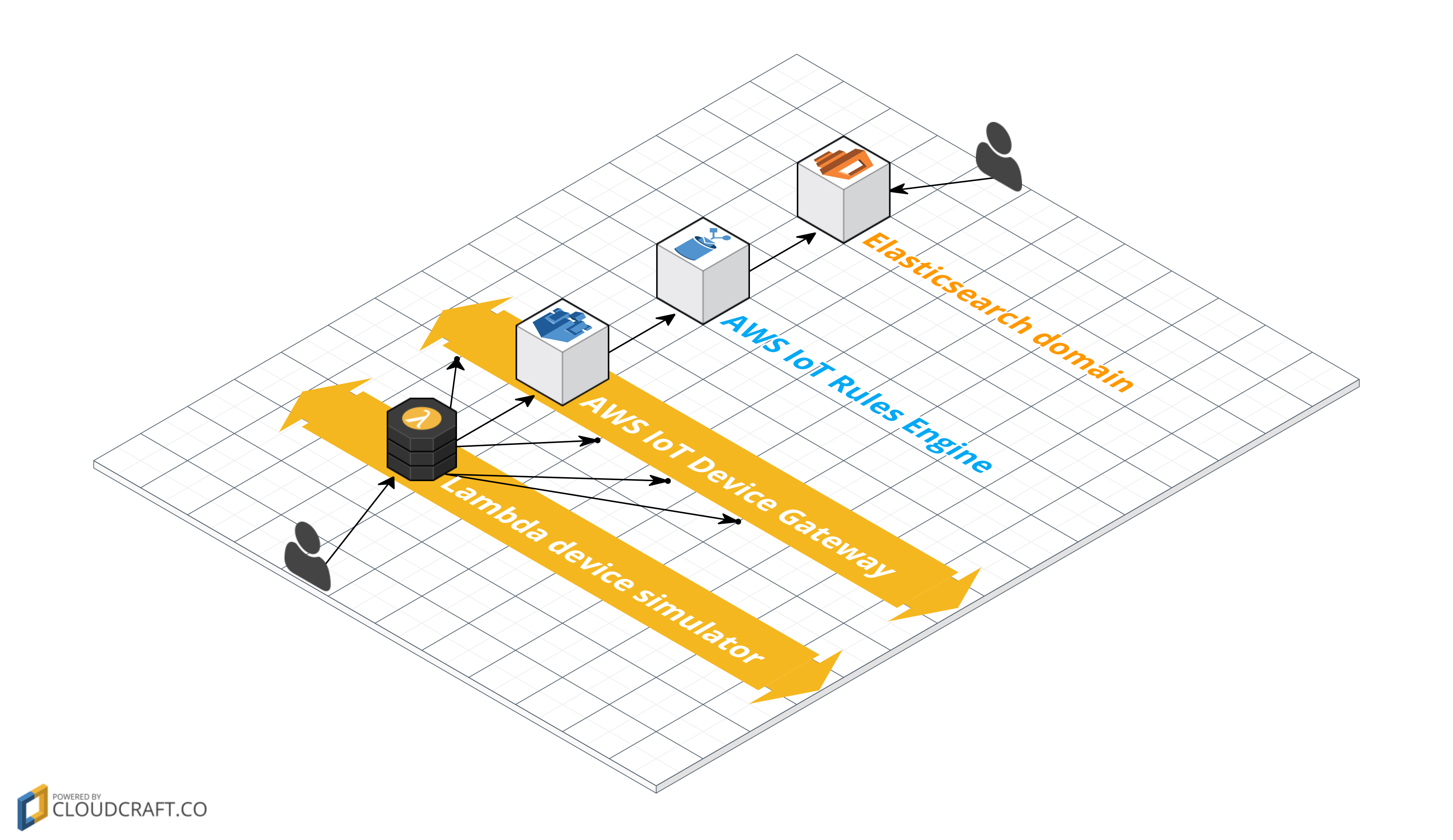SSH IoT Device Anywhere Example AWS: Your Ultimate Guide To Secure Connectivity
Imagine this: you're managing a network of IoT devices spread across the globe, and you need secure access to them anytime, anywhere. Sounds complicated? Not anymore. SSH IoT device anywhere example AWS is here to simplify your life. Whether you're a developer, IT professional, or just someone curious about how cloud-based SSH works, this guide will walk you through everything you need to know. From setting up secure tunnels to leveraging AWS's powerful tools, we've got you covered.
Let's face it—IoT devices are everywhere. From smart home gadgets to industrial sensors, they're revolutionizing how we live and work. But with great power comes great responsibility. Securing these devices is crucial, and that's where AWS steps in. AWS offers robust tools to manage SSH connections for IoT devices, ensuring your data stays safe while maintaining seamless connectivity.
In this article, we'll dive deep into SSH IoT device management, explore practical examples, and show you how AWS can transform your remote access experience. So, buckle up because we're about to take you on a journey through the world of secure IoT connections!
- Alice Rosenblum Details Controversies What You Need To Know
- Lara Rose Onlyfans Leak What Happened What To Know
Table of Contents
- Introduction to SSH IoT Device Anywhere
- Why AWS is the Best Option for SSH IoT Devices
- Step-by-Step Guide to Setting Up SSH IoT Devices on AWS
- Ensuring Security with SSH IoT on AWS
- Real-World SSH IoT Device Examples Using AWS
- Top Tools for Managing SSH IoT Devices on AWS
- Common Issues and Troubleshooting Tips
- Best Practices for SSH IoT Devices on AWS
- Future Trends in SSH IoT Device Management
- Conclusion: Take Control of Your IoT Devices
Introduction to SSH IoT Device Anywhere
SSH IoT device anywhere example AWS is more than just a buzzword; it's a game-changer for remote device management. SSH, or Secure Shell, is a protocol that allows secure communication between devices over unsecured networks. When combined with AWS's cloud infrastructure, it becomes a powerful tool for managing IoT devices from anywhere in the world.
So, what exactly does "SSH IoT device anywhere" mean? Simply put, it's the ability to securely connect to your IoT devices, no matter where they're located. Whether you're troubleshooting a sensor in a remote factory or monitoring a smart thermostat in your home, SSH ensures your connection is encrypted and protected from unauthorized access.
Why SSH Matters for IoT Devices
IoT devices are often deployed in environments where physical access is limited. This makes remote management essential. SSH provides a secure way to interact with these devices, allowing you to perform tasks like software updates, configuration changes, and troubleshooting without being physically present.
Here are some key benefits of using SSH for IoT devices:
- Encrypted communication to protect sensitive data.
- Authentication mechanisms to ensure only authorized users can access devices.
- Flexibility to manage devices from anywhere with an internet connection.
Why AWS is the Best Option for SSH IoT Devices
When it comes to managing SSH IoT devices, AWS stands out as the premier choice. AWS offers a range of services specifically designed to enhance IoT device management, making it easier than ever to secure your devices and maintain connectivity.
Here are some reasons why AWS is the best platform for SSH IoT device management:
- Scalability: AWS can handle thousands of devices without breaking a sweat. Whether you're managing a small network or a large-scale deployment, AWS scales effortlessly.
- Security: AWS provides advanced security features, including encryption, identity management, and access control, ensuring your devices remain protected.
- Integration: AWS integrates seamlessly with other tools and services, allowing you to build a comprehensive IoT ecosystem.
How AWS Enhances SSH IoT Device Management
AWS offers several services that make SSH IoT device management a breeze:
- AWS IoT Core: A managed cloud service that lets connected devices interact with cloud applications and other devices.
- AWS Systems Manager: Provides a unified interface for managing your AWS resources, including IoT devices.
- AWS CloudWatch: Monitors your devices and applications in real-time, alerting you to potential issues before they become problems.
Step-by-Step Guide to Setting Up SSH IoT Devices on AWS
Setting up SSH IoT devices on AWS might sound intimidating, but it's actually quite straightforward. Follow these steps, and you'll have your devices securely connected in no time.
Step 1: Create an AWS Account
First things first, you'll need an AWS account. If you don't already have one, sign up for a free tier account. This will give you access to a range of AWS services, including those needed for SSH IoT device management.
Step 2: Set Up AWS IoT Core
Once your account is ready, it's time to set up AWS IoT Core. This service acts as the backbone of your IoT ecosystem, enabling communication between your devices and the cloud.
Step 3: Configure SSH Access
With AWS IoT Core in place, you can now configure SSH access for your devices. This involves setting up SSH keys, configuring security groups, and ensuring your devices are properly authenticated.
Here's a quick checklist to help you through the process:
- Generate SSH keys for each device.
- Configure security groups to allow SSH traffic.
- Test your connection to ensure everything is working as expected.
Ensuring Security with SSH IoT on AWS
Security is paramount when managing SSH IoT devices. AWS provides several features to help you keep your devices safe from unauthorized access and cyber threats.
Best Security Practices for SSH IoT Devices
Here are some best practices to ensure your SSH IoT devices remain secure:
- Use strong, unique SSH keys for each device.
- Enable multi-factor authentication (MFA) for added security.
- Regularly update your devices to patch any security vulnerabilities.
- Monitor your devices for suspicious activity using AWS CloudWatch.
Real-World SSH IoT Device Examples Using AWS
Let's take a look at some real-world examples of how organizations are using SSH IoT devices on AWS:
Example 1: Smart Agriculture
One company uses SSH IoT devices to monitor soil moisture levels in remote agricultural fields. By connecting these devices to AWS, they can remotely access data and adjust irrigation systems as needed, ensuring optimal crop growth.
Example 2: Industrial Automation
In the manufacturing sector, SSH IoT devices are used to monitor and control machinery. With AWS, engineers can securely access these devices from anywhere, making it easier to perform maintenance and troubleshooting.
Top Tools for Managing SSH IoT Devices on AWS
Several tools can help streamline the management of SSH IoT devices on AWS. Here are a few worth checking out:
- AWS IoT Device Management: Provides a centralized interface for managing your IoT devices.
- AWS Systems Manager Session Manager: Allows you to start secure shell sessions with your devices without the need for public IP addresses.
- AWS CloudFormation: Automates the deployment of your SSH IoT devices, ensuring consistency and reducing errors.
Common Issues and Troubleshooting Tips
Even with the best tools and practices, issues can arise when managing SSH IoT devices. Here are some common problems and how to solve them:
Issue 1: Unable to Connect
If you're unable to connect to your device, check the following:
- Ensure your SSH keys are correctly configured.
- Verify that your security groups allow SSH traffic.
- Check your internet connection and try reconnecting.
Issue 2: Slow Performance
Slow performance can be caused by several factors. Here's how to address them:
- Optimize your device's configuration settings.
- Upgrade your AWS instance if necessary.
- Monitor your device's resource usage and adjust accordingly.
Best Practices for SSH IoT Devices on AWS
To get the most out of your SSH IoT devices on AWS, follow these best practices:
- Regularly back up your devices to prevent data loss.
- Document your setup process for easy reference and troubleshooting.
- Stay up-to-date with the latest AWS features and updates to take full advantage of their capabilities.
Future Trends in SSH IoT Device Management
The world of IoT is constantly evolving, and SSH IoT device management is no exception. Here are some trends to watch out for:
- Increased focus on security as cyber threats become more sophisticated.
- Advancements in automation and AI to simplify device management.
- Greater integration with other technologies, such as blockchain and edge computing.
Conclusion: Take Control of Your IoT Devices
SSH IoT device anywhere example AWS is a powerful solution for managing IoT devices securely and efficiently. By leveraging AWS's robust tools and services, you can take control of your devices and ensure they remain safe and operational.
So, what are you waiting for? Start exploring the world of SSH IoT device management on AWS today. And don't forget to share your thoughts and experiences in the comments below. Together, we can build a safer, smarter IoT ecosystem!



Detail Author:
- Name : Sincere Mann
- Username : oconner.chaya
- Email : schroeder.jasper@rath.com
- Birthdate : 1986-11-25
- Address : 7488 Jaylin Valley Apt. 439 Windlerhaven, MS 15081
- Phone : +13528056476
- Company : Howell-Oberbrunner
- Job : Poet OR Lyricist
- Bio : Impedit molestiae aut saepe hic. Natus inventore aut quia dolore cumque qui dicta molestias.
Socials
twitter:
- url : https://twitter.com/filiberto.maggio
- username : filiberto.maggio
- bio : Placeat doloremque ad quasi et quia. Sed fugit quae maxime dolor. Maxime et soluta omnis modi tempore error aut nobis. Earum natus facere et non quas.
- followers : 5476
- following : 1106
linkedin:
- url : https://linkedin.com/in/maggio1978
- username : maggio1978
- bio : Et illum ipsum in laudantium esse eius aut.
- followers : 3394
- following : 999
tiktok:
- url : https://tiktok.com/@filiberto1096
- username : filiberto1096
- bio : Fugit ducimus autem recusandae aut et aperiam dolores.
- followers : 3745
- following : 235
instagram:
- url : https://instagram.com/filiberto_xx
- username : filiberto_xx
- bio : Vitae ut sit quae ut eaque. Doloremque tempora eligendi voluptates non eos.
- followers : 4464
- following : 2832